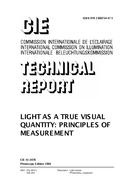Click here to purchase
This Technical Report summarizes visual photometric measurement methods which can provide visually meaningful assessments of light. They can be more complicated than the simple use of of a V(lambda)-corrected physical photometer, and in addition require some understanding of the visual system and how it works. Their advantage is that the assessment of light bears a logical relationship to the human perception of light.
For photopic vision and luminances larger than several cd/m2, ordinary physical photometers corrected to V(lambda) give visually accurate measures for small, centrally fixed, broad-band lights. For other applications, a different luminous efficiency function should be employed. In order to utilize the appropriate function, one must either measure the spectral distribution of radiant power directly or correct the V(lambda) response of the photometer to the appropriate luminous efficiency. An alternative solution is to calculate mathematical formulas specifically developed for this purpose. This method is potentially the most useful since different formulas can be developed for different applications (for example, two degree or ten degree fields).
It is based on established CIE data, and no additional measures need to be developed.For scotopic vision, an assessment of radiant power is made with respect to the scotopic luminous efficiency function V'(lambda) by means of an appropriately corrected physical photometer, by radiance measurement, or by visual photometry. In mesopic photometry, the photopic and scotopic contributions of the light must be assessed. An estimate can be obtained by combining the photopic and scotopic luminances non-linearly. A more precise measure can be obtained by using three or, still better, four quantities based on X10, Y10, Z10, and V'(lambda).
The document consists of 40 pages, 4 figures and 9 tables.
Product Details
- Published:
- 01/01/1978
- ISBN(s):
- 9783900734473
- Number of Pages:
- 44
- File Size:
- 1 file , 860 KB
